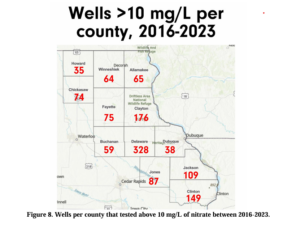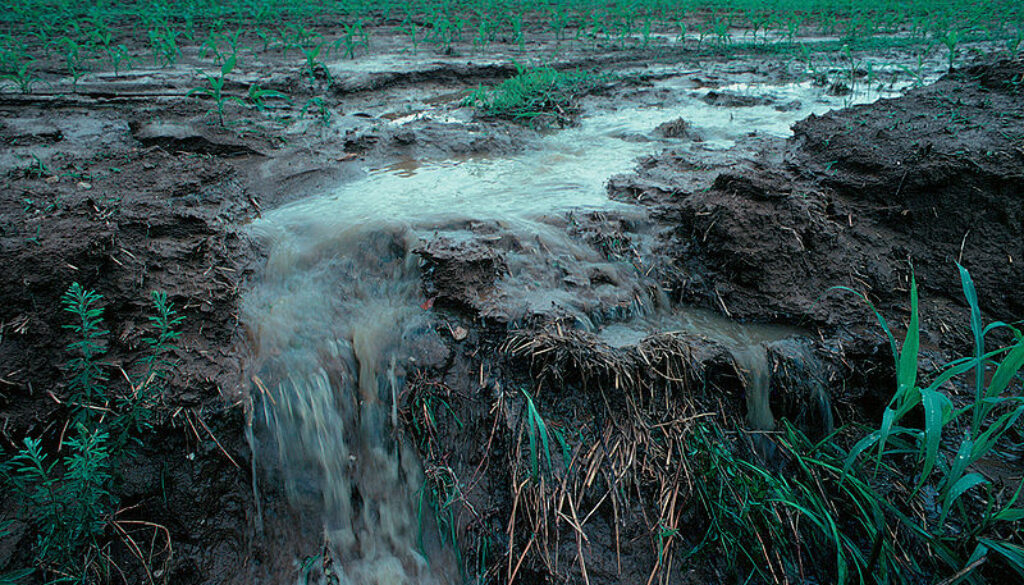EPA called to address “long-ignored health crisis” in Iowa drinking water
US regulators must take immediate action to address a “long-ignored health crisis” stemming from dangerously contaminated drinking water in Iowa, according to a legal petition filed by environmental and health advocacy groups this week.
The Iowa Environmental Council (IEC) and 12 other organizations are calling for the Environmental Protection Agency (EPA) to take a series of steps to reduce harmful nitrate pollution found in water supplies in Northeast Iowa.
The petition highlights the fact that for many years, nitrate concentrations found in thousands of private wells and some public water sources have exceeded the federal limit of 10 milligrams per liter for drinking water.
State agencies have documented the contamination, but have “failed to do what is needed to correct the pervasive threat to human health,” the petition states.
“For decades, Northeast Iowa residents have been exposed to dangerous levels of nitrate contaminated water,” Food & Water Watch attorney Dani Replogle said in a press release. “As the state reckons with high cancer levels and ongoing pollution regulation rollbacks, federal action is needed to safeguard the right to clean water. EPA must exercise emergency authority to hold polluters accountable and deliver safe drinking water in Iowa.”
Food & Water Watch is among the groups joining IEC in its petition. Others include the Environmental Working Group, the Center for Food Safety, the Environmental Law & Policy Center, and several state organizations.
All signs indicate that “dangerous contamination levels will continue or worsen, absent EPA action,” the petition states.
Farm operations are largely to blame for the contamination, both from the runoff of fertilizer applied to fields of corn and other crops, and the runoff of liquified manure generated by large livestock operations that is also often spread on farm fields. The runoff carries nitrates and phosphorus into surface and groundwaters, and ultimately drinking water.
 Iowa is one of the nation’s largest farm states for crops and livestock, and Northeast Iowa is particularly vulnerable to farm pollutants because of its “karst” terrain, which features porous limestone that allows surface pollutants to more quickly move into groundwater. All of the drinking water in the karst region of northeast Iowa depends on groundwater aquifers.
Iowa is one of the nation’s largest farm states for crops and livestock, and Northeast Iowa is particularly vulnerable to farm pollutants because of its “karst” terrain, which features porous limestone that allows surface pollutants to more quickly move into groundwater. All of the drinking water in the karst region of northeast Iowa depends on groundwater aquifers.
Despite these facts, only a small fraction of private wells are tested regularly for nitrates, which are known to cause health problems at high levels, especially for infants. Cancer is a specific concern with nitrate exposure. Still, more than 1,200 wells in the 12-county karst region tested above the federal threshold for safety from 2016 to 2023, the petition states.
Residents of the region “have been, and continue to be, ingesting this contaminant. This alone demonstrates that the endangerment is substantial,” the petition states.
The petitioners want the EPA to launch an investigation to determine why Iowa officials have not protected groundwater in the karst region, and determine what enforcement measures should be taken to reduce nitrogen pollution from large, concentrated animal feeding operations (CAFOs) and farms. CAFOs should be blocked from opening, expanding or modifying operations in the area, the petitioners say. They also want free water supplies to residents of the karst region.
Among additional demands, petitioners want the EPA to force Iowa officials to do the following:
- Create a communication plan to specify how information and responsibilities will be shared among state agencies, local governments, and any other entities acting on the response to the petition.
- Identify each residence obtaining drinking water from a private well in the region and provide immediate notice and instruction to residents.
- Create and implement a plan for drinking water sample analysis for all residents that request it.
- Offer alternate drinking water at no cost to residents for each residence where water tests show an exceedance of the maximum contaminant level (MCL) for nitrate in the private well.
- Maintain and regularly publish records that allow the public to understand the scope and severity of nitrate contamination in the karst region and measure progress in implementing the response plan.
- Provide quarterly progress reports to EPA.
“We need EPA intervention to protect Iowans from ongoing pollution,” Josh Mandelbaum, senior attorney for the Environmental Law & Policy Center said in a press release. “No Iowan should have to worry that their drinking water is contaminated with agricultural pollution, but the state’s new rules do not even begin to fix the problem.”
Late last year, the EPA ordered Minnesota state officials to address “imminent and substantial endangerment to the health” of thousands of residents there who are being exposed to high levels of nitrate contamination in their drinking water.
(Featured photo from Minnesota Environmental Partnership.)




